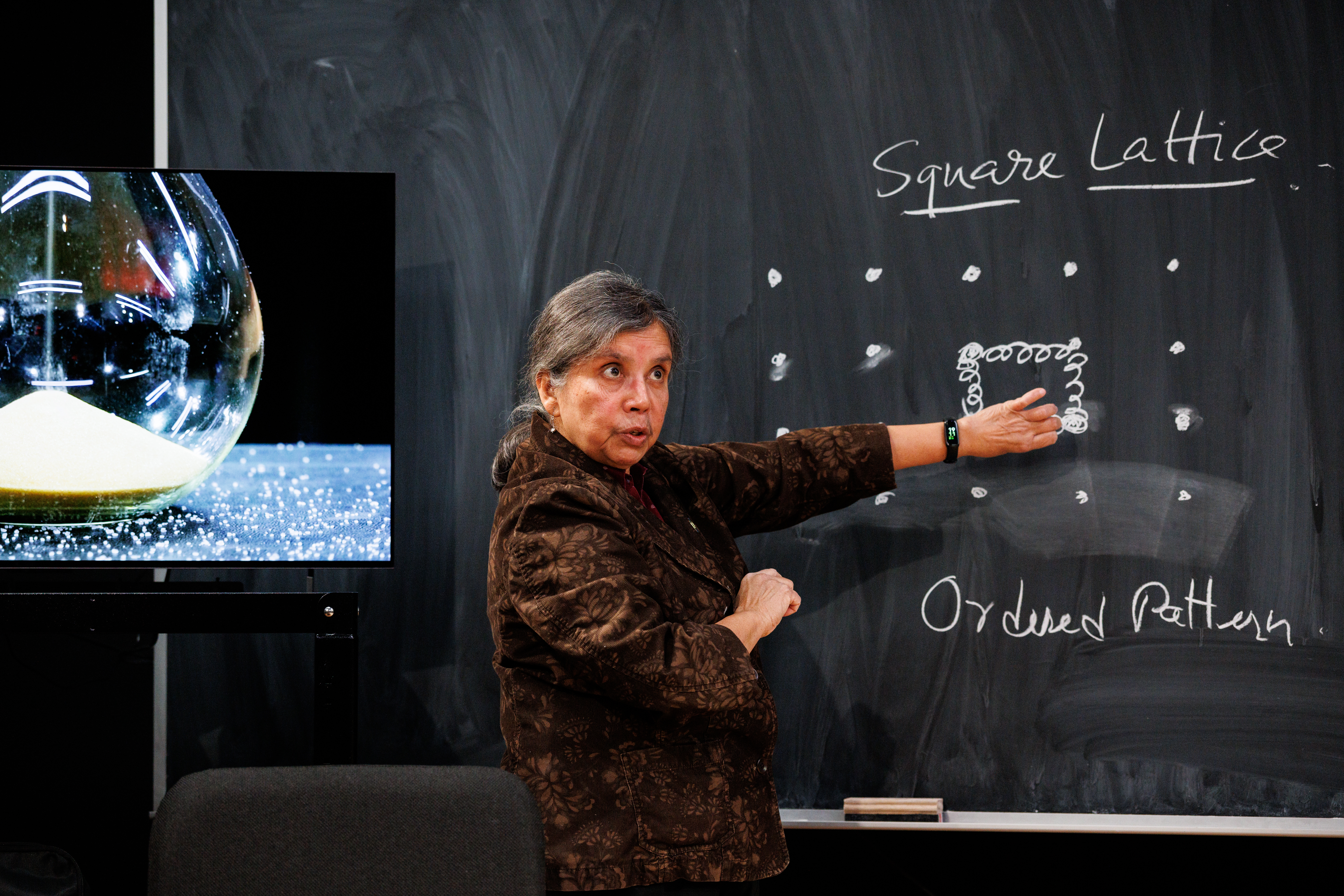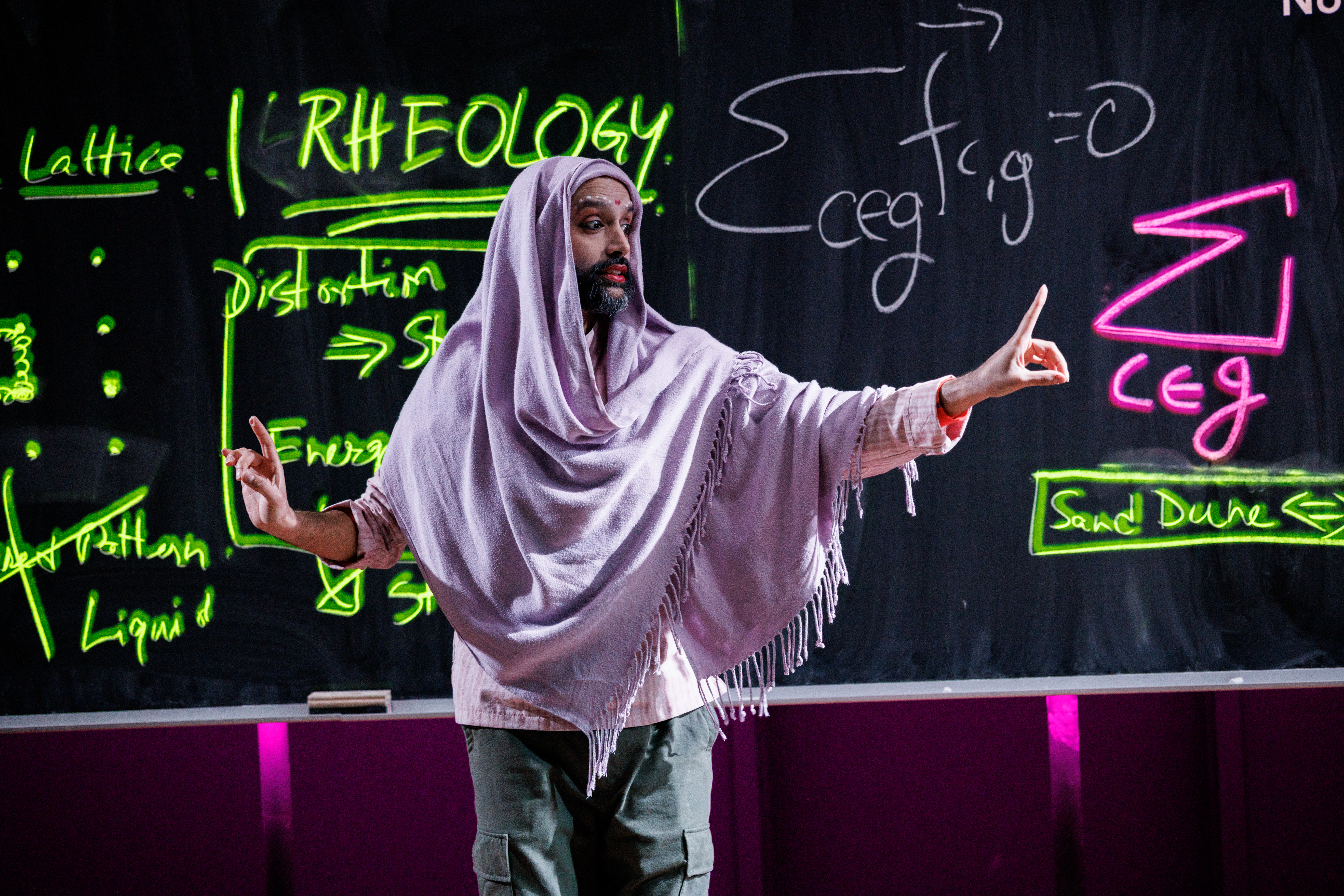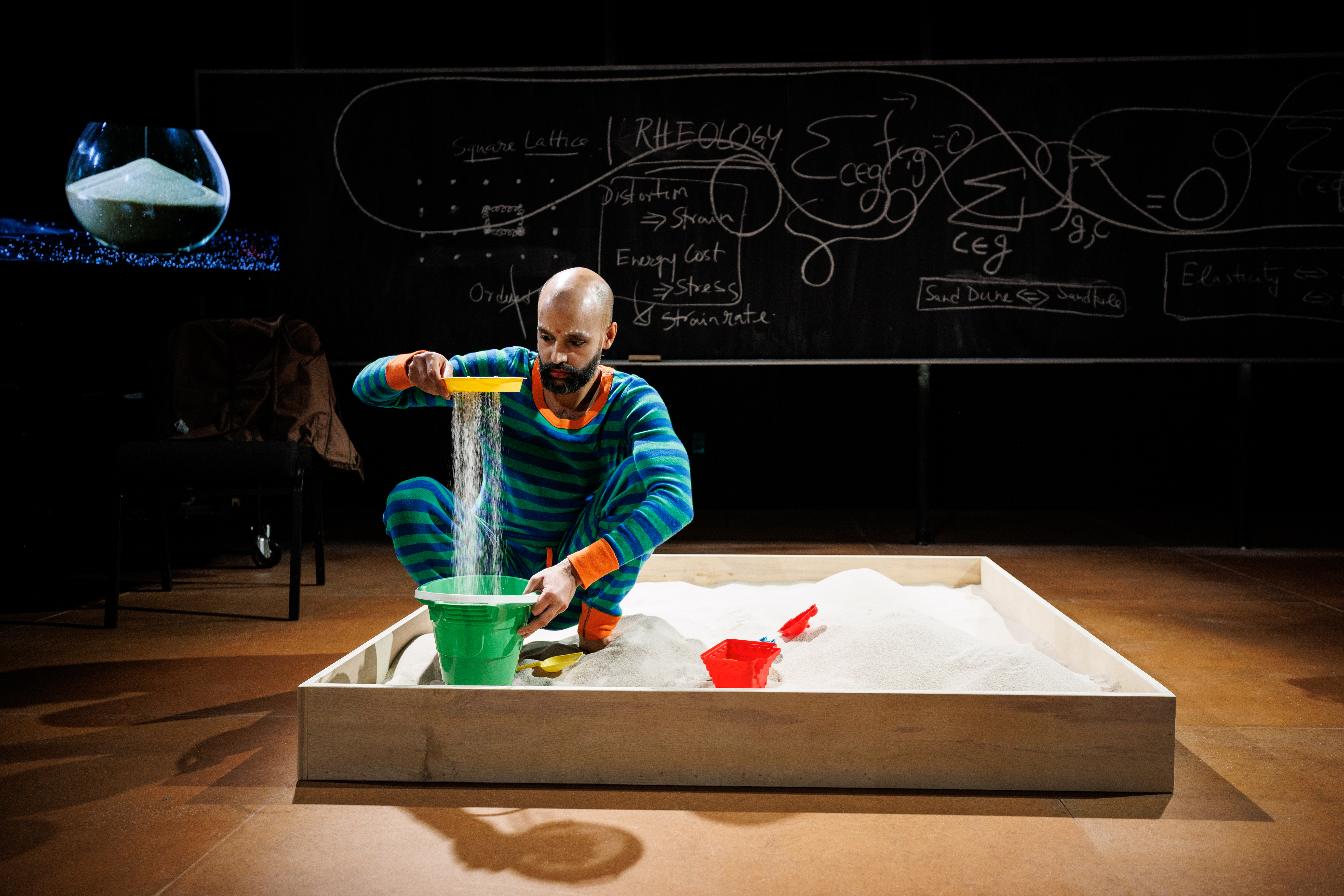How often do you consider your mother’s death?
If you are fortunate enough to have a mother who is still living, you probably try not to think about it too much.
But playwright Shayok Misha Chowdhury is not like most of us. A Pulitzer Prize finalist for his play Public Obscenities, Chowdhury has done more than dwell upon the inevitable loss of a parent—he wrote a play about it. And the Obie Award winner’s collaborator and co-star for his boundary-pushing new work is none other than Chowdhury’s own mother.
A theoretical physicist and tenured professor of physics at Brandeis University, Bulbul Chakraborty is performing in Rheology opposite her son at The Bushwick Starr through May 17. Chakraborty specializes in the study of soft condensed matter theory, with focus on granular materials. Lately, she has been particularly obsessed with sand. For Bulbul, the ebbing grains of an hourglass are an object of scientific fascination. Her son. Misha, sees a frightening reminder of the swift passage of time.
A theatrical experiment that defies easy classification, Rheology began as a way for Misha to understand his mother more fully: what her work means and who she is to her colleagues. But as the two developed the piece together, it grew into a meditation on loss, time, and the endlessly unfinished task of fully understanding one another.
Extended Play sat down with Misha and Bulbul to discuss their process in creating the piece together.

JOEY SIMS: How did you first arrive at the idea of collaborating on this piece as mother and son?
MISHA: It started with a video of my grandmother, my mom’s mom, taken in the last couple years of her life. She was bedridden, and at that point her memory was gone. But when my grandmother was asked to recite a poem by Rabindranath Tagore [the Indian writer, philosopher and activist], she was able to recite the poem in full.
The poem, ‘Nirjharer Swapnabhanga,’ can be interpreted as being about an avalanche. My mother studies avalanches. I wondered if there was a way into thinking about the behavior of granular materials, through the personal prism of my grandmother, that could help me understand my mother and her work—while she is still here.
BULBUL: In 2019, I had a major breakthrough in theory. Something that I had been struggling with for more than a decade in my work just broke open. I was talking to Misha about the excitement of that new understanding.
MISHA: Her difficulty in translating it was the first kernel of like: “Ooh, what would it mean to dig into this?” There is such a distance between what each of us do, playwriting and physics. I wondered: Could we make something, through the prism of our own relationship, that felt rigorous and interesting for both of us?
JOEY: Many children never really get around to sitting down with their parents and learning about them in this way. Fully understanding what they do, their field of expertise, all the complete other versions of a patent that a child might never see.
MISHA: That is very much the conceit of the play. To some degree, me and mom already know everything about each other. I’m an only child, there are no secrets between us, she has seen all my work. But even given that, it’s impossible for her to access who I am with my colleagues in a rehearsal room; or for me to know who my mom is to the people who respect her professionally. Doing this has moved us beyond a facile respect for and recognition of each other’s work, and really pushed us into the gnarly details.
BULBUL: Embedding myself into the theatrical process has been a real eye-opener. Just the rigor of this profession. Until you experience it, you don’t know what it is, because we just see the finished product.
MISHA: And I have been discovering the playfulness and wonder and collaboration inside of science. Theater folks probably imagine science to be rigorous but not playful, just as you imagined theater to be playful but not rigorous.

JOEY: What form does this journey of discovery take on stage?
MISHA: The conceit of the evening is that we are using our respective disciplines to design and conduct an experiment together, but the experiment has two competing objectives: I am trying to hold onto my mother by making her do this show with me, whereas my mom is trying to prepare me for her eventual death. She is trying to teach me how to lose her; I’m trying to hold onto her even harder.
JOEY: There’s a similarity between science and theater that you are hitting upon. A scientist has to view what they’re doing as one little piece in a much longer narrative, one that will be carried forward by others. Theater is not dissimilar in the sense that it exists briefly and then is gone, but we hope something was carried forward.
BULBUL: That’s an amazing way of putting it. What I do as a scientist doesn’t end anything—it opens a new path, or a new avenue, to go and look at other things. So the work never ends. That has always been the excitement of physics, for me. My goal is to open up new ways of looking at things, and then I’ll often move over to something else.
MISHA: There is, within the show, an articulation of the fact that my experiment only works as long as this show is going. After that, I’m afraid that my mom will go back to Massachusetts and I’ll have to contend with the loss of this new arrangement. I’m trying to hold onto my mom using theater, but theater is inherently ephemeral.

JOEY: You’re speaking to the fear everyone has when saying goodbye to a parent or elder, that voice in the back of your head that goes: “What if this is it?” What if the next thing is a phone call, and something happened? Most people just push down that voice and try not to think about it. With this show, you two are doing the opposite.
MISHA: Rehearsals have been intense for that reason. The thing that has been hardest for me to talk about or think about, my whole life, has been [to Bulbul] the inevitably of losing you. That’s not what we set out to make this piece about, but the thing that is scariest between us is where we ended up.
We came into that question from my own fragility and fear, and what it brought up for me. But now that we’re in the thick of the process, you’ve been coming to terms with what that brings up for you. The piece is about a child reckoning with seeing a parent in their full personhood, and it’s been hard to sit for so long in the question of one’s own morality.
BULBUL: Which is something I hadn’t thought about at all. That’s not true. I’m 71, I have thought about it. But doing this show has pushed me to think about it in a different way. To consider what it means.
RHEOLOGY runs at The Bushwick Starr through May 17. Click here to learn more about the show and to purchase tickets.
Extended Play is a project of The Civilians. To learn more about The Civilians and to access exclusive discounts to shows, visit us and join our email list at TheCivilians.org.
Author
-

Joey Sims has written at The Brooklyn Rail, Vulture, The Body, Sherwood, Broadway.com, TheaterMania, American Theatre Magazine, Culturebot, Exeunt NYC, New York Theatre Guide, No Proscenium, and is a Senior Critic at Theatrely. He was previously Social Media Editor at Exeunt, and a freelance web producer at TodayTix Group. Joey is an alumnus of the Eugene O’Neill Theater Center’s National Critics Institute. He runs a theater substack called Transitions
View all posts








